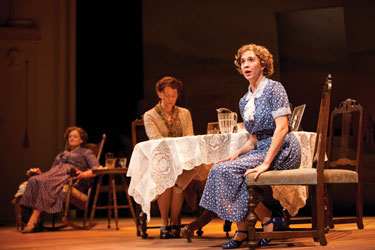Deconstructions
The Carpetbagger's Children is a potent and effective piece, while Black Watch is a unique exploration into the Iraq regiment
It’s not often that a top Washington tourist destination aims to reach the stone-washed masses and the discerning, over-educated locals, but Ford’s Theatre strives undaunted. Despite a side-lobby with about as much charm as an airport concourse, the theater itself remains an eerie, thoughtfully preserved glimpse into American’s past. It is a room full of ghosts and the ghosts of brave ideas. To sit as an audience member in full view of Lincoln’s empty box, draped with its funereal restraint, is to experience interactive history at its subtlest and best – at least for Washington. And with its production of Horton Foote’s The Carpetbagger’s Children, an intimate view of Post-Reconstruction American, Ford’s delivers not only on its historical mission, but also on its bid to offer the kind of theater that might just draw the chattering classes.

Carpetbaggers
(Photo by T. Chrales Erickson)
Told in round-robin, Foote gives us three sisters who recount the seminal moments of their lives within (and sometimes without) their tight-knit family. As Northerners who settled in a small Texas town after the Civil War, their experiences touch upon the many tensions with their Southern neighbors who mostly saw them as post-war opportunists, or carpetbaggers. Yet this is only part of the story, as much of what haunts and buoys these sisters over the decades are the same struggles shared by many families and their women.
Essentially in-character story-telling, a play like Carpetbaggers can only be as watchable as its players. This is especially true here, for even with his often lyrical and insightful moments, Foote gives his women an enthusiasm for who-knows-who-and-why detail only a maiden aunt could love. Thankfully, with their keen grasp of the rhythms to be found even in Foote’s most cataloging moments, this is never a problem for the production’s powerhouse trio of actors. Indeed, despite a few teacherly moments catering to Foote’s need to set the historical scene, Holly Twyford, Nancy Robinette and Kimberly Schraf bring their women – with all their angst, regrets and joys — to full and vibrant life.
Although there is a powerful melancholy to Carpetbagger’s Children, captured with a remarkable resonance, there is also a grounded stoicism. The quiet resolve is personified in Cornelia (Kimberly Schraf), the sister who, finding herself at the helm of the family’s farm and fortunes, must navigate their needs amid the changing times. Schraf speaks to us with her face as much as with Foote’s words, and with her conflicted eyes, shares the heavy load of doubts, regrets and secret hopes born by this family stalwart. She has been strong for everyone, made the difficult choices, and lost hold of her own dreams along the way. When Schraf tells us her story, we have no doubt that she has lived it. It is a superb performance.
In the role of Sissie, self-proclaimed baby of the family, Holly Twyford draws a keen portrait of a woman whose world has been kept small by the well-meaning protections of her family. Never over-playing, Twyford captures Sissie’s innocence but also her sense of what lies beyond the artificial boundaries of her life. To his credit, Foote chooses Sissie to speak most clearly to the play’s intense melancholy; having her sing of the inevitability of death and the futility of controlling anything but perhaps one’s own little corner of the world. Twyford beautifully balances Sissie’s childlike innocence with her channeling of these sadnesses without ever falling to the saccharine or mawkish.
As Grace Anne, the reluctant black sheep of the family, Nancy Robinette has the great challenge of making this un-self-actualized woman compelling. Of the trio, she is Foote’s most labored character; a woman who tends toward the diatribe and the weeds. With great skill, Robinette finds and keeps the rhythm of the character, making credible her hopes and delusions.
As an evocative contemplation of a time, place and the tolling of the bell, The Carpetbagger’s Children is a potent and effective piece — and well worth the braving of a few tourists.
HAILING FROM THE other side of the pond but offering a similarly telescopic view of a distinct time and culture is Gregory Burke’s Black Watch. On American tour from the National Theatre of Scotland, this unique exploration into the experiences of the regiment of the Black Watch in Iraq defies categorization. Or perhaps invites it — all of it. At times grittily realistic, at others artfully impressionistic, this is theater that speaks as much to the possibilities of expression as it does to its subject matter.




To Feb. 13
Ford’s Theatre
511 10th St. NW
202-397-7328
fordstheatre.org
BLACK WATCH



To Feb. 6
Harman Hall
610 F St. NW
202-547-1122
shakespearetheatre.org
Underpinning the play (and based on the playwright’s own experiences), are the attempts of a civilian researcher to interview an edgy group of Black Watch veterans. As the researcher begins to draw memories and impressions from the reluctant men, the scenes shift rapidly via vignettes and interludes of near-balletic movement, from intense war zone interactions to contemplations of such intangibles as why the Black Watch were sent to Iraq and how the soldiers perceived the regiment’s history and identity. The study works best when not messaging on the politics of the war; a debate to which the play adds little.
A striking ensemble piece physically and dramatically, the narrative is nevertheless well-anchored by a convincing Paul Higgins as the interviewer and Sergeant, a charismatic Ian Pirie as the Officer and Lord Elgin, and the compelling Paul Tinto and Scott Fletcher as the soldiers Cammy and Kenzie. With its visual imagery of the war and a soundscape of news reports, exploding ordinance and some deeply affecting Scottish folk music, this innovative theatrical montage is a unique treatment of men, war and tribal unity.
Support Metro Weekly’s Journalism
These are challenging times for news organizations. And yet it’s crucial we stay active and provide vital resources and information to both our local readers and the world. So won’t you please take a moment and consider supporting Metro Weekly with a membership? For as little as $5 a month, you can help ensure Metro Weekly magazine and MetroWeekly.com remain free, viable resources as we provide the best, most diverse, culturally-resonant LGBTQ coverage in both the D.C. region and around the world. Memberships come with exclusive perks and discounts, your own personal digital delivery of each week’s magazine (and an archive), access to our Member's Lounge when it launches this fall, and exclusive members-only items like Metro Weekly Membership Mugs and Tote Bags! Check out all our membership levels here and please join us today!





















